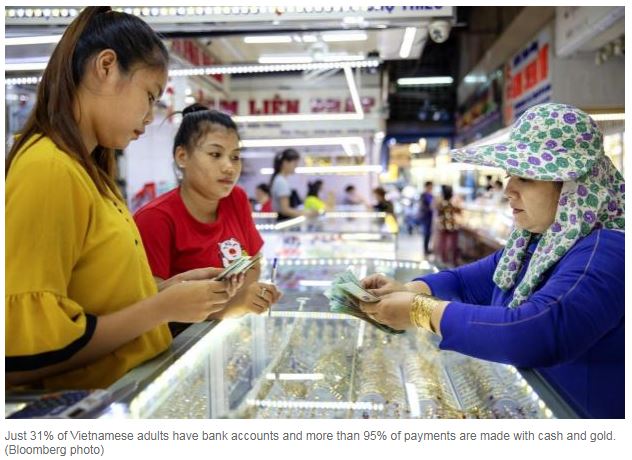Cash is still king for most of Vietnamese citizens
HANOI: Vietnam may be one of the world’s fastest-growing economies, yet it’s still in the dark ages when it comes to joining the global trend toward cashless transactions.
To understand why, look no further than to consumers like Tran Van Nhan, who recently bought his two-bedroom home in Hanoi with gold and a sack of cash.
“We paid almost half in gold bars and the rest in cash,” Nhan, a 47-year-old shopkeeper, said of his new copy38,000 condo. “We did that because we and the flat’s owner didn’t want to do a bank transfer. We are so used to buying things with cash and gold.”
Prime Minister Nguyen Xuan Phuc is trying to drag his citizens into the modern era of digital payments, reduce the amount of US dollars in circulation in the country and establish the dominance of the nation’s domestic currency, the Vietnamese dong.
That also means introducing Vietnamese households to credit cards, bank transfers and digital payments rather than carrying around piles of cash and bullion for purchases.
Behind the push is growing frustration among Vietnamese officialdom about the cost of printing banknotes and the need for more transparent payment records in order to crack down on tax evasion and money laundering, a growing problem as the $237-billion economy continues to expand dramatically.
Officials have their work cut out for them: Just 31% of Vietnamese adults have bank accounts and more than 95% of payments are made with cash and gold, according to the government.
“It’s embedded in the culture,” said Hanoi-based economist Nguyen Tri Hieu, senior adviser to National Citizen Bank. “It’s holding Vietnam back. The government recognises that to integrate Vietnam into the world economy, its cash-based economy has to change.”
The government has made modernising the nation’s payments a top priority. The prime minister is directing banks to reduce cash transactions to less than 10% by the end of 2020. E-commerce is being promoted at malls and supermarkets in major cities and the government wants at least 70% of Vietnamese aged 15 and older to have bank accounts.
An exasperated Phuc also ordered the central bank this year to convince more Vietnamese to use digital payment systems, such as QR codes. A new regulation in January mandated providers of public services — from hospitals to schools — to stop accepting cash by December.
Unlike in China, home to the world’s biggest mobile payments market, most of Vietnam’s 97 million citizens rely on paper currency — and precious metals — to buy everything from groceries to automobiles. Shopowners make numerous trips to banks during the week, hauling sacks of Vietnam dong like Santas on motorbikes.
Many Vietnamese, who remember double-digit inflation at its peak of 28.3% in Aug 2008, still like to keep their savings in greenbacks and gold stored in home safes.
“Vietnamese hold an estimated 400 tonnes of gold,” economist Hieu said. “People are still hoarding gold.”
Meanwhile, just 4.1% of Vietnamese own credit cards, according to Standard Chartered Plc.
“About 80% of my clients pay cash and I also feel more comfortable taking cash than credit card payments,” said Nguyen Thu Huong, 44, who operates a clothes shop in Ho Chi Minh City’s central financial district.
“It’s not easy to change,” said Tran Thi Le, a 35-year-old Ho Chi Minh City secretary who keeps gold and foreign currencies in a home safe. “Keeping money in gold or strong foreign currencies, like US dollars or euros, is a long-standing habit for most Vietnamese people.”
Indeed, Hanoi shopowner Nhan and his wife set aside money to buy gold bars.
“I want to save gold so that we can use it in the future for our retirement,” he said. “We feel safer with gold.”
Source: https://www.bangkokpost.com/business/world/1685508/cash-is-still-king-for-most-of-vietnamese-citizens


 English
English




